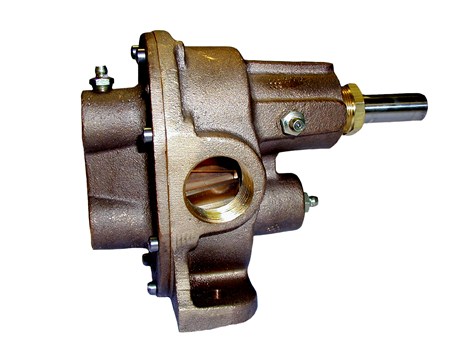PT FTS Indonesia
Pump housings and gears are made of top quality bronze, shafts are 303 stainless steel. Bearings are made of high performance carbon-graphite material selected for wear resistance and long service life. Gear pumps are positive displacement pumps. Each shaft revolution displaces a definite amount of liquid relatively unaffected by the backpressure in the discharge line. Shaft speed and flow are directly proportional.
Gear Pumps N9000L
FEATURES
- Bronze corrosion resistant castings
- Special cast bronze helical gears for quiet operation
- Stainless steel shafts & fasteners
- Synthetic braided compression packing (with Polytetrafluoroethylene (PTFE) dispersion) is standard
- Optional lip seals are available
- Positive displacement flow
- Bronze bearing surfaces with grease fittings
LIQUIDS & TEMPERATURES
Service life will be increased substantially if the liquid pumped is clean and has some degree of lubricity. These positive displacement pumps have tight tolerances. Fine abrasives like sand, silt, or powders in suspension will accelerate pump wear and reduce throughput. Liquids compatible with bronze and stainless steel can be pumped providing proper seal has been specified, (see chemical compatibility or check factory). No carbon bearings used. When possible, flush the pump after each usage. Temperature extremes are detrimental to service life and should be avoided. Basic metals of construction allow a temperature range of – 40 to 400°F. Some lip seal elastomers have a limit of 212°F, (see engineering data or check factory). Allowing a liquid to freeze in the pump can cause damage. *For pressures over 100 psi, the above selections are suitable for pumping fluids with lubricity (e.q. oils, polymers). Service life will decrease for fluids without lubricity (e.q. water, solvents).
SUCTION LIFT
Close tolerances and the positive pumping action make the rotary gear pump capable of lifting water on the suction side as high as 20 feet. Though gear pumps are self priming, a foot valve is recommended. If possible, wet the gears with liquid to be pumped for the first dry start. Liquid retained in the system and gear chambers serves to “wet” the pump on subsequent starts. The pump by-pass is not intended to be a metering or flow control device. Its main purpose is to function as a pressure relief when the desired set point is exceeded, overheating can occur within 5 -10 minutes if the discharge line is completely shut off for extended periods. Reversing rotation reverses the “IN” and “OUT” ports and the location of the by-pass ports have to be reversed. The by-pass valve is factory set at 50 p.s.i. To increase the set point, turn the bypass valve adjusting screw in a clockwise direction.
SEALS
MOUNTING AND DRIVE ARRANGEMENT
Pumps should be mounted on a rigid base and properly aligned with the motor. Direct drive via flexible shaft coupling is the preferred method. When a belt drive is needed, additional support is necessary to absorb the added pulley load. this can be accomplished in two ways:
1) Use the standard pump arrangement by adding an independently supported jackshaft (see figure 2 below) or use kit 79P
2) When space is an issue, use an optional “long shafted” pump and add a properly shimmed pillow block bearing
Order Enquiry Form
Contact form description text






